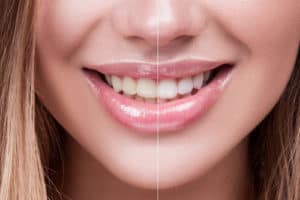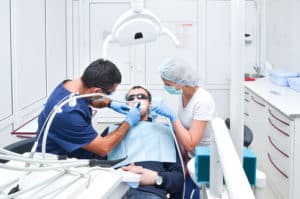
Over-Whitening Is Possible
Even though we all strive for a beautiful, white smile, there is such a thing as over-whitening. In fact, teeth that are too white can have the opposite effect that we were trying to achieve in the first place and can cause some problems. Some common negatives that go along with over-whitening include:
An easy, yet unofficial way to find out how white your teeth should be is to try to match them to the whites of your eyes.
How to Safely Whiten Your Smile
Even though there can be negative side effects of over-whitening, you shouldn’t let that stop you from getting a whiter smile, but you should start by talking with your dentist in Farmington Hills. Together, you can find the best way to whiten your teeth. Some common whitening treatments include:
Once you decide on a treatment, make sure you read and follow any directions of your chosen product. Never leave a whitening product on longer than recommended as this can increase the risk of gum irritation, cause sensitivity, and can damage enamel. Stop use of the whitening treatment if you do have any sensitivity or irritation and talk with your dentist.
There are many different ways you can get a brighter smile, but you can whiten your teeth too much which can lead to larger problems. We always recommend starting your journey to a whiter smile by scheduling an appointment with your dentist in Farmington Hills. If traditional smile whitening treatments aren’t appropriate for you, we can explore additional cosmetic dentistry options that can still transform your smile.
Welcoming new patients at all of our dental offices in Ann Arbor, Canton, Farmington Hills, and Livonia.

Quit Smoking
Perhaps the top cause of tooth discoloration and unsightly staining is smoking. The tobacco and other ingredients in cigarettes are known to coat teeth and cause yellowing. Additionally, since smoking is usually a habit that’s done several times throughout the day, teeth are constantly exposed to the staining ingredients, making the stains more severe and harder to remove. Your dentist in Canton supports quitting smoking – as it’s a leading cause of additional oral health problems such as oral cancer.
Eat Foods that Help
We all know that certain foods and drinks can cause tooth staining such as red wine, tea, coffee, soda, and even pasta sauce. But there are also some foods that can actually help reduce staining. Snacking on crunchy vegetables and fruits, and even some types of cheese gently scrub the surface of teeth and can effectively remove some staining in the process.
Brush After Meals
One of the best things you can do for both the appearance of your smile and the health of it is to brush your teeth twice a day. However, brushing your teeth after meals, in addition to brushing in the morning and at night, can go even further in preventing staining and decay. After all, the sooner you’re able to remove anything that can cause staining, the less of a chance it has to discolor your teeth.
Swish, Rinse, & Chew
For those times when you can’t brush your teeth after eating, the next best thing you can do is swish and rinse your mouth out with water. Water will help wash away any lingering staining agents before they have a chance to settle in and cause discoloration. If you want to take it one step further, chew sugarless gum to remove even more food particles.
Choose a Straw
A simple way to reduce the risk of tooth discoloration when drinking tooth-staining beverages is to sip them through a straw. Straws essentially allow the liquid to bypass teeth and lowers the likelihood of staining. There are several reusable straws you can buy and carry with you in case you run into a situation where straws aren’t available.
Even though there are steps you can take to reduce the risk of staining, tooth discoloration can, and does, still happen. In this case, there are several cosmetic dentistry options available to reverse discoloration and whiten teeth. From tooth whitening treatments to dental veneers, your dentist in Canton can help find the best cosmetic dentistry for you.
Stop covering your smile for pictures or when you laugh. Call us today to figure out how you can get the white smile you deserve.
Accepting new patients at all of our dental offices in Ann Arbor, Canton, Farmington Hills, and Livonia.

From Kissing to Cavities
How exactly does someone catch a cavity from kissing? Well, it’s a little complicated, and in fact, cavities aren’t technically contagious. However, the bacteria that can cause cavities are. Our mouths are home to thousands of different types of bacteria, some are good bacteria and some are bad. These bacteria can be swapped back and forth between two kissers, and if one of you has an abundance of bad bacteria, it can increase the risk for cavities. But don’t worry, it’s not all bad news.
Benefits of Kissing
There are both whole-body and oral health benefits associated with kissing. From an overall wellness perspective, kissing can release endorphins and make us happier, work out facial muscles, and may even burn a calorie or two. When it comes to kissing and oral health, we already covered how good bacteria can transfer from person to person, but your dentist in Ann Arbor doesn’t want to forget about the saliva. Yes, we’re talking about spit. While that may sound gross, spit is an important part of oral health. Saliva helps wash away excess bacteria and neutralizes acids that can wear away tooth enamel. When we kiss, saliva production increases and can further protect oral health.
Kiss Safely
Kissing a great way to show someone that you love them, but as we know now, it doesn’t come without risks. Kissing someone who is sick can spread illness very easily since germs and viruses are also swapped through saliva. It can also increase someone’s risk of cavities. But this doesn’t mean you have to stop smooching altogether. There are things you can do to reduce your risk of spreading (or catching) cavity-causing bacteria through kissing such as:
Don’t forget, kissing is a two-way street, so both you and your partner should follow the tips above to protect yourselves from catching anything besides a healthy, happy mistletoe kiss.
Accepting new patients at all of our dental offices from Ann Arbor, Canton, Farmington Hills, and Livonia.

There are some things your dentist can tell you about you just from looking at your teeth, even if you don’t volunteer that information with them. Let’s take a look at some of the things your dentist in Livonia may notice about you and your habits.
Why would your dentist care if you nervously or habitually bite your nails? Well, nail biters often have tiny chips or cracks in their teeth that may be invisible to the naked eye but can show up on dental x-rays. These cracks provide a great place for bacteria to nestle in and increase the likelihood of decay. Nail biters may also suffer from TMD or TMJ thanks to changes in their bite. TMD/TMJ disorder can be a painful condition that may also lead to headaches and increased jaw pain or jaw clicking.
One of the most common habits patients try to hide is being a smoker. They’ll use perfume, mints, mouthwash, and everything in between to try and cover up the smell of cigarettes. But the truth is, your dentist in Livonia can probably still tell that you smoke. You see, cigarette smoke doesn’t just disappear. In fact, the smell can seep into the soft tissues of your mouth and linger around long after you light up. Additionally, smokers tend to have telltale tooth staining as a result of the nicotine.
We know that you don’t like to floss, nobody does. But it is incredibly important that you do your best to floss every day. If you don’t, and you save your annual flossing session to the day before or the day of your appointment, we’ll know. Patients who avoid flossing often have swollen, red gums that bleed almost as soon as their appointment begins. Bleeding gums are unhealthy gums and may be a sign of gum disease.
Similarly to flossing, your dental team will also be able to tell if you don’t brush your teeth often enough or even if you brush too hard. Those who don’t brush the recommended two times a day will often have larger areas of tartar buildup and puffy, red gums. Additionally, if you brush too hard you may have gum recession or worn enamel which can cause tooth sensitivity and increase your chances of cavities.
We encourage you to always be honest with your dentist in Livonia and every member of your healthcare team. If we don’t know about certain things that can affect both your health and your treatment, you won’t get the best care possible for you. We understand that some things may be embarrassing to share, but it’s important to know that your dental team is only here to help you, not to judge you.
Accepting new patients at all of our dental offices in Ann Arbor, Canton, Farmington Hills, and Livonia.

A Peek at Plaque
It makes sense for us to start by taking a look at plaque. Plaque is something that accumulates on everyone’s teeth each and every day. It’s unavoidable, it’s sticky, it’s packed full of bacteria, and it can cause a whole lot of trouble. You see, plaque forms as a result of foods we eat and latches on to the area around the gum line. The bacteria that make up this sticky substance then start to feed on food particles in the mouth. As a result, the bacteria release an acidic byproduct. This acid then attacks the tooth enamel, wearing away at this protective layer and leaving teeth at increased risk of cavities. If plaque is not removed every day, it will start to harden and turn into tartar.
Tartar Troubles
Tartar is very similar to plaque but, essentially, is a more progressed version. Also known as calculus, tartar is a super hard substance that occurs when plaque is not properly removed. Additionally, while plaque is invisible, once it transforms into tartar it can appear as yellow or brown lumps. Another key difference between tartar and plaque is that while you can effectively remove plaque on your own, your dentist in Farmington Hills is the only one that can remove tartar once it forms. Like plaque, tartar can increase the risk of cavities as well as other problems, including tooth discoloration, sensitivity, and gum disease.
Preventing Plaque Problems
Since tartar occurs as a result of plaque buildup, it’s important to take a look at how we can prevent problems from plaque in the first place. The most effective way to remove plaque is to practice proper oral hygiene by brushing and flossing every day. Make sure to brush both morning and night to remove plaque that has built up overnight and throughout the day. Additionally, choosing what you eat can also help keep plaque away. Try to pick plaque-busting foods like cheese and crunchy vegetables and avoid sugary foods and drinks. Drinking plenty of water throughout the day can help wash away bacteria, neutralize acids, and further protect teeth.
Outside of brushing, flossing, and eating well, it’s also crucial that you see your dentist in Farmington Hills twice a year. These checkups give your dental team the opportunity to monitor your oral health, catch problems early, and remove any tartar buildup before it can create trouble.
If it’s time for you to see your dentist, we welcome you to call our Farmington Hills dental office to schedule an appointment.
Accepting new patients at all of our locations in Ann Arbor, Canton, Farmington Hills, and Livonia.

There are an estimated 30 million Americans with diabetes. That’s 30 million people who are focused on checking and maintaining their blood glucose levels several times a day. After all, keeping blood glucose numbers within a healthy range is how diabetics stay healthy and avoid hyperglycemia, hypoglycemia, or long-term problems like organ damage. But your dentist in Canton wants you to know that maintaining blood sugar can also help decrease the risk of gum disease. Gum disease is a serious infection in the gum tissues that can also lead to some whole-body concerns such as heart disease. Additionally, like any infection, gum disease can cause blood sugar spikes and make diabetes difficult to manage.
One of the best ways to keep blood glucose levels in check is to choose healthy foods and follow a well-balanced diet. Avoiding sugary sweets and hidden sugars in high carbohydrate foods not only helps prevent blood sugar spikes, but it can also protect teeth against decay. Whenever possible, choose nutrient-rich foods like fruits, veggies, and lean meats or follow your diet plan as recommended by your doctor.
Your dentist in Canton knows just how important it is for everyone to brush their teeth every day, whether they’re diabetics or not. However, practicing good oral hygiene is even more important for those who have diabetes as it can go a long way in keeping gum disease at bay. Good oral hygiene includes brushing your teeth twice a day, every day for at least two minutes, using fluoride toothpaste, and flossing in between each and every tooth daily. It’s also important to gently brush your tongue to remove any bacteria that may have wiggled their way into the hidden peaks and valleys.
Besides brushing your teeth regularly and flossing every day, it’s incredibly important for both diabetics and non-diabetics to see their dentist in Canton every six months for a professional cleaning and a thorough checkup so that we can catch and treat any potential problems early.
If it’s been longer than six months since your last dental visit, call to schedule an appointment. We’ll be happy to see you.
Accepting new patients at all of our locations in Ann Arbor, Canton, Farmington Hills, and Livonia.

Gum Disease & Alzheimer’s
An article published earlier this year by the National Institute on Aging shows promising research regarding a potential cause of this debilitating disease. The culprit at the center of the study? Gum disease.
Gum disease is an infection of the gum tissues caused by a buildup of bacteria. Poor oral hygiene, tobacco use, and some medications are just a few of the things that increase someone’s risk of developing gum disease. Gum disease can lead to tooth loss, bad breath, and whole-body issues such as heart disease and now, as suggested by recent research, Alzheimer’s.
The Research
The research from the National Institute on Aging takes a closer look at how gum disease can cause Alzheimer’s. In short, it has to do with a type of bacteria that can cause gum disease. Our mouths are home to hundreds of different types of bacteria, but the one that concerns dentists and researchers alike is one known as Porphyromonas gingivalis. In the study, this form of bacteria was the most common cause of gum disease. Additionally, one of the major staples found in Alzheimer’s patients called plaque of beta-amyloid protein may be produced as a byproduct of gum disease caused by Porphyromonas gingivalis bacteria.
In another study from the Journal of Alzheimer’s Disease, brain tissue samples were taken from patients with dementia and from those without dementia. What researchers found was that the dementia patient tissue contained gum disease bacteria whereas the non-dementia tissue did not.
But how do bacteria in the gums end up in the brain? Well, infections can easily enter the bloodstream and be carried to other areas of the body, including the brain. This is also how gum disease can contribute to heart disease.
Preventing Gum Disease
The best way to prevent gum disease, and therefore perhaps Alzheimer’s, is to have good oral hygiene habits. Make sure you brush your teeth twice a day, gently scrub your tongue, and floss in between every tooth daily to further remove dangerous bacteria. It’s also important that you see your dentist in Ann Arbor at least every six months.
While additional research is needed in order to further understand the potential connection between gum disease and Alzheimer’s, researchers are on the right track. Besides, brushing your teeth and seeing your dentist in Ann Arbor can only benefit you, even if it may not completely prevent Alzheimer’s.
Welcoming new patients at all of our locations in Ann Arbor, Canton, Farmington Hills, and Livonia.

Bad Bacteria
Bacteria can be found throughout the body, including in the mouth. While most of these bacteria aren’t dangerous and many can actually be helpful, there are also bad bacteria. These are what concern your dentist in Livonia. Bad bacteria can increase the risk of tooth decay as well as gum disease, both of which can affect oral health and overall health. In fact, gum disease in particular has been linked to several whole-body problems. According to the Mayo Clinic, recent studies show that oral bacteria and inflammation due to gum disease are related to health issues including:
Oral Health Clues About Overall Health
As we mentioned earlier, your mouth may also provide clues about other problems happening elsewhere in the body before you even suspect anything. Your dentist in Livonia will be on the lookout for signs of:
Taking care of your oral health can help protect your smile as well as your overall health. Make sure to brush and floss every day and see your dentist at least twice a year for preventive checkups.
We’re always accepting new patients at all of our dental offices in Ann Arbor, Canton, Farmington Hills, and Livonia.

Avocados
A mushed-up ripe avocado is one of the best things you can eat after dental treatment. Not only is it easy to eat, but avocados can provide your body with needed healthy fats and a ton of nutrients, including vitamin C, vitamin K, potassium, and fiber. These are some of the reasons that it’s often called a superfood.
Broth
Broth or soup is another excellent choice. Not only is it comfortingly warm, but it also requires little to no chewing. Beef bone broth, in particular, is also packed with protein, which is important. In fact, according to a study conducted by the University of Michigan, soft foods with healthy fats and protein like beef bone broth may also even help promote healing by repairing muscles and tissues and fighting off infection. Remember, if you’re recovering from wisdom teeth removal or other oral surgery, keep your broth warm and not hot. Hot foods and drinks can irritate gum tissue and make recovery take longer.
Scrambled Eggs
This breakfast favorite isn’t only for mornings and would be easy to eat at any time following dental treatment. Similarly to bone broth, scrambled eggs are a healthy, protein-packed option that’s easy to eat and promotes healing. Besides, who doesn’t love breakfast for dinner?
Fish & Potatoes
If you’re looking for something that feels more like a complete meal, look no further than fish and potatoes. Fish such as tuna, salmon, and tilapia are soft and easy to chew, and they contain a lot of heart-healthy fats. Pair fish with delicious mashed potatoes for a delicious, nutritious, and easy-to-eat meal. Spice up the dish by choosing sweet potatoes over russet.
Ice Cream
We couldn’t complete this blog without turning to the age-old favorite of ice cream. This sweet treat is a go-to option for your dentist in Farmington Hills because it’s easy to eat and it’s cold. The coolness of ice cream is the perfect way to get some relief if you’re feeling sore and may even reduce swelling. Make sure to avoid flavors that contain nuts, frozen candy bars, or other hidden crunchy goodies.
Even if you don’t necessarily feel like eating after dental treatment, it’s important that you do. If it’s easier, choose to eat several smaller meals or snacks throughout the day instead of large meals. Also, make sure to drink at least 64 ounces of water daily to keep your body and mouth properly hydrated.
Your dentist in Farmington Hills is always here to help you if you have any questions about your dental treatment, or what you can comfortably eat afterward. Just ask!
We’re always accepting new patients at all our dental offices in Ann Arbor, Canton, Farmington Hills, and Livonia.

What Do Dental Hygienists Do?
Many patients believe that hygienists only clean teeth. The truth is, they do so much more. In fact, it’s not uncommon for patients to see and spend more time with their hygienists than their dentist, they do that much! While laws and rules differ from state to state and a hygienist’s specific duties can vary accordingly, there are some common things that many hygienists do on a daily basis such as:
How Do You Become a Dental Hygienist?
To become a dental hygienist, one needs to receive training and get certified. Many hygienists attend a local community college, technical college, dental school, or university programs to complete the recommended courses and training. It usually takes around two years to become a licensed dental hygienist, and many students will receive an associate’s degree. But some universities even offer four-year degrees, along with master’s degree programs. After a degree is received, hygienists will then take a licensing exam on either the state, regional, or national level.
This month, and every month, take time to thank your dental hygienist for all they do to help keep you healthy. And if you’re overdue for a dental cleaning, call your dentist in Canton to schedule an appointment with a dental hygienist today!
Accepting new patients from Ann Arbor, Canton, Farmington Hills, and Livonia.